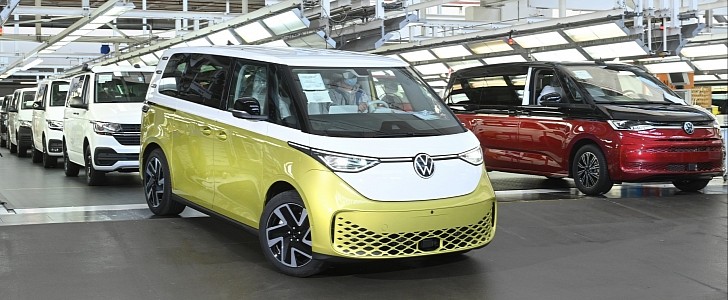First revealed in the guise of a concept back at the 2017 North American International Auto Show, the ID. Buzz was revealed in production-spec form a few months ago. Series production kicked off at the Volkswagen Commercial Vehicles facility in Hannover in early June, and the German automaker has already stopped making the ID. Buzz over a peculiar issue.
The supplier of the 82-kWh battery with a net capacity of 77 kWh is to blame. According to Hannoversche Allgemeine Zeitung, these batteries feature bad cell modules that may drop the voltage. This condition is said to reduce driving range and may pose a safety risk in worst-case scenarios.
Quality-related deficiencies were discovered at the unnamed supplier, yet Volkswagen refused to share them with the cited publication. Around 500 vans were manufactured with the bad cell modules. None have been delivered thus far, which is a godsend for the Wolfsburg-based company.
ID. Buzz production is expected to restart in the week of July 4th.
Not exactly the most affordable van out there, Volkswagen’s first commercial vehicle based on the MEB platform is rocking a €54,430.60 price tag in Germany. The ID. Buzz, therefore, costs $57,605 at current exchange rates. A few thousand euros more, and you’re getting a Tesla Model Y Long Range with the dual-motor setup. Pretty crazy stuff, right?
The ID. Buzz also leaves a few things to be desired, starting with its RWD-only powertrain. The interior plastics aren’t up to snuff either, which is a deficiency shared with the ID.3 hatchback and ID.4 crossover.
Currently offered exclusively with the regular wheelbase, the ID. Buzz will grow a few inches once it arrives in the United States of America. Gifted with 201 horsepower in both cargo and passenger flavors, the all-electric van will be joined by six- and seven-seat variants in due time.
Rated at 229 pound-feet (310 Nm), the European model is limited to 90 miles per hour (145 kilometers per hour). VW estimates 425 kilometers ( 264 miles) of range for the ID. Buzz Cargo and 423 kilometers (263 miles) for the ID. Buzz Pro on the Worldwide Harmonized Light Vehicle Test Procedure.
Quality-related deficiencies were discovered at the unnamed supplier, yet Volkswagen refused to share them with the cited publication. Around 500 vans were manufactured with the bad cell modules. None have been delivered thus far, which is a godsend for the Wolfsburg-based company.
ID. Buzz production is expected to restart in the week of July 4th.
Not exactly the most affordable van out there, Volkswagen’s first commercial vehicle based on the MEB platform is rocking a €54,430.60 price tag in Germany. The ID. Buzz, therefore, costs $57,605 at current exchange rates. A few thousand euros more, and you’re getting a Tesla Model Y Long Range with the dual-motor setup. Pretty crazy stuff, right?
The ID. Buzz also leaves a few things to be desired, starting with its RWD-only powertrain. The interior plastics aren’t up to snuff either, which is a deficiency shared with the ID.3 hatchback and ID.4 crossover.
Currently offered exclusively with the regular wheelbase, the ID. Buzz will grow a few inches once it arrives in the United States of America. Gifted with 201 horsepower in both cargo and passenger flavors, the all-electric van will be joined by six- and seven-seat variants in due time.
Rated at 229 pound-feet (310 Nm), the European model is limited to 90 miles per hour (145 kilometers per hour). VW estimates 425 kilometers ( 264 miles) of range for the ID. Buzz Cargo and 423 kilometers (263 miles) for the ID. Buzz Pro on the Worldwide Harmonized Light Vehicle Test Procedure.






















